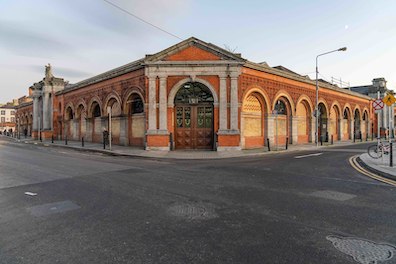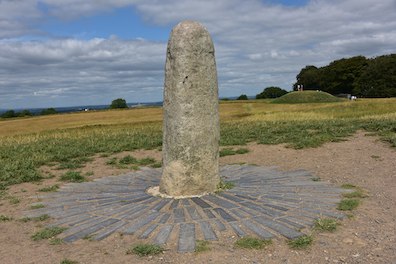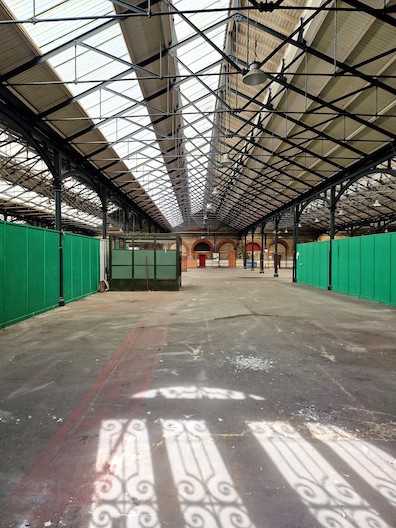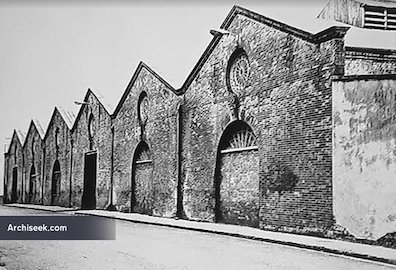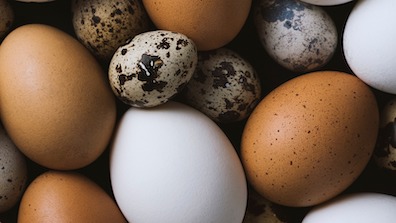"Inisfail the fair" quotes from the first line of Prince
Alfrid's Itinerary through Ireland, Mangan's 15-quatrain
translation of an old poem in Irish:
I found in Innisfail the fair,
In Ireland, while in exile there,
Women of worth, both grave and gay men,
Many clerics and many laymen.
I traveled its fruitful provinces round,
And in every one of the five I found,
Alike in church and in palace hall,
Abudant apparel and food for all.
Gold and silver I found in money;
Plenty of wheat and plenty of honey;
I found God's people rich in pity,
Found many a feast, and many a city....
Alfrid was a prince, and later King, of the Saxons in
Northumbria. In his
Life of St. Cuthbert, Bede mentions
his having been educated in Ireland ca. 684 AD. Alfrid's
educational accomplishments evidently included facility in the
Irish language, which he employed in writing this poem. The word
inis means "island," and the
Fál or
Lia Fáil
was the Stone of Destiny on the Hill of Tara in County Meath,
where all the early kings of Ireland were said to have been
crowned.
Inisfail is thus the Island of Destiny, a name
that carries with it thoughts of a bygone heroic age.
Alfrid sings the praises of the men and women of Ireland's
various provinces: "Armagh the splendid," Munster, Connaught,
Connall [Donegal], Ulster, Boyle, "Leinster the smooth and
sleek, / From Dublin to Slewmargy's peak," Ossorie, Meath.
Joyce's parody closely follows the language of the poem when
it says that "Lovely maidens" inhabit Erin's landscapes, "And
heroes voyage from afar to woo them, from Eblana [Dublin
before Dublin existed] to Slievemargy, the peerless
princes of unfettered Munster and of Connacht the just and
of smooth sleek Leinster and of Cruahan's land and of Armagh
the splendid and of the noble district of Boyle, princes,
the sons of kings."
The heroizing continues in the following sentence when H.
O'Connell Fitzsimon (listed in the 1904 Thom's
directory as superintendent of the food market) is seen
inventorying "herds and fatlings and firstfruits of that
land": "for O'Connell Fitzsimon takes toll of them, a
chieftain descended from chieftains." The spirit of
surveying Ireland's regions returns at the end of the parody's
third paragraph: "pasturelands of Lusk and Rush and
Carrickmines and from the streamy vales of Thomond, from the
M'Gillicuddy's reeks the inaccessible and lordly Shannon the
unfathomable, and from the gentle declivities of the place of
the race of Kiar."
These mentions of places and people impart an air of epic
(and archaic) Irish greatness to the parody, and its epic
catalogues of foodstuffs may likewise have been conceived as a
response to the many mentions of food in Alfrid's poem. But on
the subject of natural bounty Joyce found his own notes to
sing. His seemingly endless enumerations of fishes, trees,
vegetables, fruits, and animals announce a new technique in Ulysses:
prodigious lists reminiscent of biblical begats or Homeric
ships. The lists continue in many other parodies in Cyclops,
and they also figure prominently in Circe and Ithaca.
Catalogues like these are an ancient literary device, but
Joyce added to them his own distinctive notes of wild mockery.
In large part his parodic description of the markets sounds
like a reprise of the grandioloquent speech
about Ireland's natural wonders read aloud by Ned Lambert in Aeolus.
Dan Dawson's purple prose—e.g., "bosky grove and undulating
plain and luscious pastureland of vernal green, steeped in
the transcendent translucent glow of our mild mysterious
Irish twilight"—expresses a proud Hibernophilia that was
much in vogue at the turn of the last century, feeding the
enthusiasm for Celtic Twilight imagery in literature and
promoting postcolonial visions of agricultural independence
among activists. But Joyce holds it up to mockery, having the
men in the newspaper office rail on "the inflated windbag!"
Rather than relying on outside commentary, the Cyclops
parody mocks itself from within. After listing ten kinds of
fish that swim in Irish waters, the prose oafishly invokes
infinity: "the mixed coarse fish generally and other denizens
of the aqueous kingdom too numerous to be enumerated."
Artificial treatments of nature render nature artificial:
"other ornaments of the arboreal world with which that region
is thoroughly well supplied." Dawson's love of unnecessary
adjectives devolves into complete absurdity: "the lofty trees
wave in different directions their firstclass foliage."
Adjectives that don't do much in the first instance are
ineptly repeated: "Lovely maidens sit in close proximity to
the roots of the lovely trees singing the most lovely songs
while they play with all kinds of lovely objects." Verbosity
begets tautology: "mariners who traverse the extensive sea in
barks built expressly for that purpose." Hyperbole produces
bathos: "highly distinguished swine." Exceptionalism becomes
ridiculous: "oblong eggs."
As with all instances of Joycean mockery, however, it is
worth considering the possibility of some jocoserious
intent. The large Victorian structure called the Fruit and
Vegetable Market, which opened for business in December 1892,
was a source of great civic pride. It replaced an assortment
of dirty street stalls with one architectually magnificent and
hygienically conceived market. The Fish Market next door, also
built in 1892 and opened a few years later, was less
architecturally interesting but no less grand in scale. Slote,
Mamigonian, and Turner observe that the word "crystal"
that Joyce attaches to the produce market's glass roof might
have been meant to evoke the famous iron and glass Crystal
Palace that was built for the Great Exhibition in London in
1851. Sited in a very run-down, squalid part of north-central
Dublin, the new markets represented a hopeful kind of urban
transformation. One may perhaps hear in Joyce's overblown
lists of Irish natural bounty some quiet appreciation for
heroic civic accomplishment.
